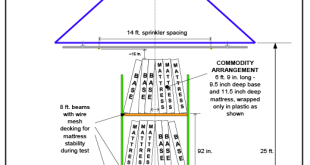The 2023 NFPA Annual Conference & Expo® in Las Vegas was a huge success. After several days of educational sessions and networking opportunities, the event concluded with the Technical Meeting, where all the certified amending motions (CAMs) were discussed before finalizing the F2022 and A2023 standards. In the May/June issue of Sprinkler Age, AFSA published a voting guide for the 2023 NFPA Technical Meeting. This issue will revisit the relevant CAMs and discuss the outcome of each vote.
NFPA 14, Standard for the Installation of Standpipe and Hose Systems CAM 14-10 – Vertical Standpipe System Zones Beyond the Pumping Capabilities of the Fire Department
Reject Second Revision No. 36
AFSA Position: SUPPORT
Result of Vote: PASSED (241-65)
CAM 14-10 passed and has been forwarded to the technical committee for ballot. The membership agreed that vertical standpipe system zones that are partially or wholly beyond the pumping capabilities of the local fire department are not required to have a fire department connection. In this case, the technical committee has the option of accepting the new language or returning the language to the previous edition. Due to the substantial reorganization of NFPA 14 this cycle, the vote is anticipated to support the NFPA membership and accept the language proposed by CAM 14-10.
CAM 14-17 – Breach Control Valves
Reject Second Revision No. 28
AFSA Position: OPPOSE
Result of Vote: FAILED (48-242)
This vote reaffirmed the technical committee’s position that automatic breach control valves are not permitted to be installed in standpipe systems. Ultimately, there are no breach control valves that have been evaluated or listed for use in fire protection systems, but it is expected that this topic will come up again during the current revision cycles for NFPA 13 and NFPA 20, 2025 editions. It should be noted that all of the water-based fire protection installation standards are harmonized in the requirement to prohibit the use of automatic breach control valves.
CAM 14-18 – Hose Connection Caps & Rated Pressure
Reject Second Revision No. 35
AFSA Position: SUPPORT
Result of Vote: FAILED (70-235)
CAM 14-18 failed the vote, and the 2024 edition of NFPA 14 will include requirements to provide a minimum 1/8-in. hole in hose connection caps that cannot withstand the maximum pressure available at the hose connection outlet. While AFSA supported this CAM so that better language can be developed for the next edition of NFPA 14, the current language will suffice in the meantime. It should be noted that caps on standpipe hose connections are NOT required. Threads are only required to be protected, and there are several alternative installation options that can be used that would eliminate the need to drill a hole in a cap.
Other CAMs
CAM 4-1 – Passive Fire Protection Systems
Reject Second Revision No. 2
AFSA Position: OPPOSE
Result of Vote: PASSED (150-118)
For the second cycle in a row, CAM 4-1 passed the vote on the floor. Whether you support the inclusion of passive fire protection systems in the integrated testing of buildings or not, this issue boils down to semantics. Clearly, there is no practical way to verify the rating of a fire-rated wall while testing that the alarm and notification system properly activates stair pressurization fans. To fully “integrate” passive systems, live test fires would have to be ignited in buildings. Regardless, NFPA 3 and NFPA 4 are standards that must be applied together. Whether you interpret the re-commissioning of a passive fire protection feature as an integrated test or not, the end result of this vote does not change the application of either standard.
CAM 101-10 – Valet Trash in Sprinklered Buildings
Accept Second Revision No. 53
AFSA Position: SUPPORT
Result of Vote: PASSED (128-86)
After six failed motions to modify the valet trash requirements in residential occupancies, CAM 101-10 passed and will forward an amendment ballot to the technical committee to determine if existing apartment buildings that utilize valet trash services will be required to be fully sprinklered or if the committee will decide to stay silent on the issue as there is no previous text in the 2021 edition. As a principal member of the NFPA 101 technical committee for residential occupancies, AFSA will be voting to support the language approved by NFPA membership and require existing apartment buildings to be sprinklered if the building management offers valet trash services.
Next Steps
Looking ahead to the 2024 Technical Meeting, NFPA 13, NFPA 13R, NFPA 13D, NFPA 20, NFPA 24, NFPA 291, and others will be on the docket. AFSA will hold webinars on proposed changes to these standards. Reach out to AFSA to get involved in the NFPA standard development process.
 ABOUT THE AUTHOR: Kevin Hall, M.Eng., P.E., ET, CWBSP, PMSFPE, is the senior manager of engineering and technical services for the American Fire Sprinkler Association (AFSA). He is a member of, and involved in, several National Fire Protection Association (NFPA) technical committees responsible for developing the model codes and standards, including NFPA 1 Fire Code, NFPA 13/13R/13D Installation of Sprinkler Systems, NFPA 20 Installation of Stationary Fire Pumps for Fire Protection, NFPA 30 Flammable and Combustible Liquids Code, and NFPA 915 Remote Inspections. He also represents AFSA on numerous UL standard technical panels responsible for revising and maintaining the product standards used in the sprinkler industry. He is a registered professional engineer in Delaware and Maryland, NICET III certified in water-based system layout, a Certified Water-Based System Professional (NFPA), and a professional member of the Society of Fire Protection Engineers. He earned his Bachelor of Science and Master of Engineering degrees from the University of Maryland, College Park, in fire protection engineering. In 2021, he was recognized as one of SFPE’s “5 Under 35” award recipients. Before his association and committee work, he worked for Reliance Fire Protection in Baltimore, Maryland as a project manager overseeing projects of various sizes and complexity for the Contracts Division.
ABOUT THE AUTHOR: Kevin Hall, M.Eng., P.E., ET, CWBSP, PMSFPE, is the senior manager of engineering and technical services for the American Fire Sprinkler Association (AFSA). He is a member of, and involved in, several National Fire Protection Association (NFPA) technical committees responsible for developing the model codes and standards, including NFPA 1 Fire Code, NFPA 13/13R/13D Installation of Sprinkler Systems, NFPA 20 Installation of Stationary Fire Pumps for Fire Protection, NFPA 30 Flammable and Combustible Liquids Code, and NFPA 915 Remote Inspections. He also represents AFSA on numerous UL standard technical panels responsible for revising and maintaining the product standards used in the sprinkler industry. He is a registered professional engineer in Delaware and Maryland, NICET III certified in water-based system layout, a Certified Water-Based System Professional (NFPA), and a professional member of the Society of Fire Protection Engineers. He earned his Bachelor of Science and Master of Engineering degrees from the University of Maryland, College Park, in fire protection engineering. In 2021, he was recognized as one of SFPE’s “5 Under 35” award recipients. Before his association and committee work, he worked for Reliance Fire Protection in Baltimore, Maryland as a project manager overseeing projects of various sizes and complexity for the Contracts Division.
 Sprinkler Age A Publication of the American Fire Sprinkler Association
Sprinkler Age A Publication of the American Fire Sprinkler Association



